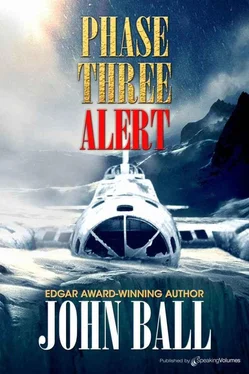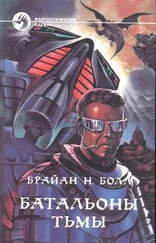He looked at her now, rested his hand against the side of her fuselage, and then looked up at the brilliantly repainted insignia. “And fuck the whole goddamn air-safety branch too,” he said aloud. “Until they get their thumbs out of their asses and learn what the score is.”
He felt better after that. He did not yet know that Colonel Kleckner had, within the past hour, had a final answer to his well-supported request for reconsideration of the decision concerning the B-17. Norton had said “No” with force and clarity. Furthermore, it was made completely clear that the subject was closed. It was suggested that the revived bomber be shipped out on a convenient vessel to a supply depot. There it would be considered as a possible exhibit for the Air Force museum at Wright-Patterson Air Force Base. Disassembly was recommended.
Colonel Kleckner sat in his office with his counterpart, Colonel Jason of the United States Army. The door was again closed and the discussion was private. “Now that’s the situation,” Colonel Kleckner said. “For the moment I’m sitting on Norton’s final decision; if I let that one out of the bag, then morale all over this base is going to hit rock bottom — which is about where I am right now on this whole thing.”
“How can I help?” Jason asked.
“By creating a diversion. You see, Jack, within the next sixty days a good forty percent of the personnel who worked on restoring the B-17 will be rotated back stateside to other assignments. Once they are out of here, and replaced with new people who had no stake in the job, the tension will be proportionately less. So every week that goes by without an explosion is an added period of grace.”
“Who know about this?”
“The two or three communications people who handled the message from Norton; I have the lid on them. I also notified the chaplains for obvious reasons. Now, it would help immensely if you and your crew at Camp Century could manage to kick up a storm — to require a lot of support and keep my hands fully occupied.”
“As a matter of fact, Jim, I’ve been deliberately going the other route — keeping a low profile so as not to upset you and your operation too much. There is a great deal we could ask for, and to our benefit.”
“Then start asking. Bring people in and out; create some action. If anyone has so much as a sore throat, call for a medevac. How do you read me?”
“I read you five-square, Jim, on the same frequency. To start with, I would like to rotate my people back here for R and R — for a good base exchange, for some different food, for a chance to see some daylight. Perhaps you could lay on some recreational trips in the vicinity and delegate people to take our guys out to see the sights.”
“Rest and recreation at Thule is something new, I must admit — but we can do it, as of now. Just give my people something to do, and something else to think about.”
“We will: I’ll have my PE officer get up some teams to challenge Thule in every sport we can think of.”
“Excellent! That’s what I need, Jack. I can’t sit on this forever, but I want the blow to be as easy as I can make it.”
“Is there any chance of your air-safety people changing their minds?”
“None whatever — I asked to have a senior engineering officer come up here to inspect the B-17 himself and see what a phenomenal job our people did on it, but they wouldn’t go along.”
Jason got up. “We’ll start making waves as of tomorrow,” he promised. “I’ll keep it up until you say ‘when.’ ”
“God bless you,” Colonel Kleckner concluded.
* * *
In a matter of days the activity at Thule was redoubled. The base swarmed with Army men who were there on a variety of different assignments. An Army chaplain preached the morning Protestant sermon to an increased congregation. Several hiking parties were organized to go up Mount Dundas. Captain Tilton, who did not directly know the reason for all this, but who could make a shrewd guess, increased the publication frequency of Thule Times to weekly and added more pages to cover the Army activities. An interservice sports tournament drew a good number of participants. While all of this was going on, each week the rotator brought fresh personnel and took back some of the old hands who had been engaged in Operation Penguin.
During this time the days began to grow darker at midnight and the temperatures that had been reaching the mid-fifties were sinking steadily. A mild Phase Alert occurred, giving warning that before long Thule would again be in the fierce grip of the Arctic, with its bitter, savage winds and the blackness of unrelieved night.
Colonel Kleckner had slightly less than two months to go on his own tour, but he still had not released the information that the B-17 had been permanently grounded. His playing for time had been at least partially successful; more than thirty percent of the rebuilders had left the base and those who remained had probably drawn their own conclusions. When he checked his personnel charts, the colonel saw that in another three weeks he would lose four of his best NCO’s, all of whom had elected to return to civilian life. They were experienced and valuable career men, but they had had it with the Air Force and they did not mind saying so.
In six weeks a major segment of Det. 4 would be replaced en masse; one week after that Sergeant Feinberg would be on the outbound list. The two C-130 crews were intact and no orders had been cut to relieve them; the Army was still busy at Camp Century and some colder-weather experiments had been scheduled.
At 1535 hours on Thursday afternoon, Angelo in Base Weather put out a notification of a probable incoming phase. New personnel were immediately rebriefed on the exact meaning of Arctic storms and of the acute danger that they represented. Once again the story was told of the cook who had attempted to run from one building to another ninety feet distant during a Phase Two without bothering to put on his arctic clothing. His frozen body had been recovered by rescue crews a few hours later.
Phase Alert was declared at 2120 hours. The temperature was plummeting and the winds were growing rapidly into howling intensity. Announcement of Phase One conditions followed eighteen minutes later. The base movie at once shut down, the library closed, and all personnel were advised to return to their quarters without delay. The base taxi service went into high gear to get everyone delivered in minimum time.
At 2210 hours conditions had deteriorated drastically and the weather section declared Phase Two. In Building 708 the command post was opened and the head count of all persons at Thule was activated. By that time the raging storm outside was hammering against the well-protected windows, and the more experienced hands knew that a full-flung Phase Three was a definite possibility. The Trackmaster crews were already with their vehicles, ready to respond to any calls for rescue assistance.
Four men who had been in a six-pack truck en route from J Site were the cause of concern until they phoned in that they had, per regulations, taken shelter in one of the phase shacks along the road. After a check with Weather, the colonel dispatched a Trackmaster to recover them and bring them back to base.
The head count was completed in thirty-nine minutes; everyone had been accounted for. Lieutenant Kane, the Transportation Officer, shut down the last of the taxi service and ordered all vehicles off the roads until further notice — rescue equipment excepted.
At two minutes after midnight the PA system came on with the expected announcement that Phase Three was in effect. The rage of the Arctic weather took complete command of Thule and no one dared to venture outside for any reason whatsoever. The Army detachment reported from Camp Century that everything had been secured as far as possible and that all personnel were safe in their barracks under the ice.
Читать дальше












